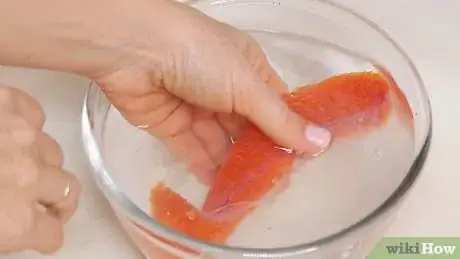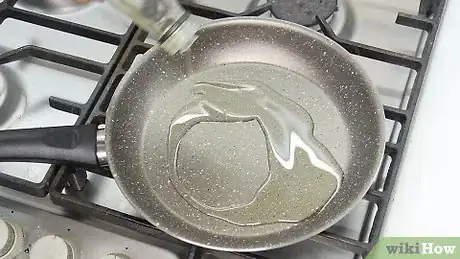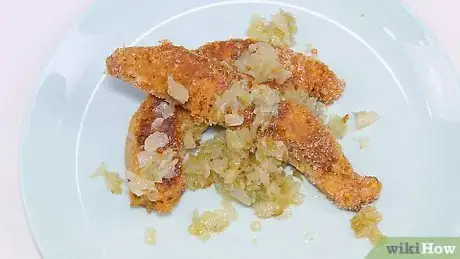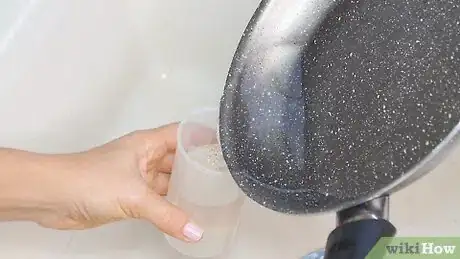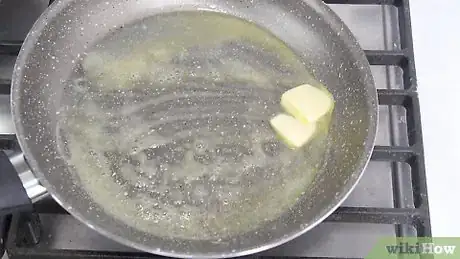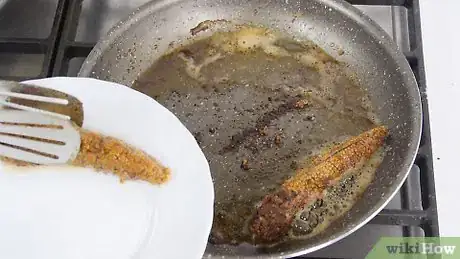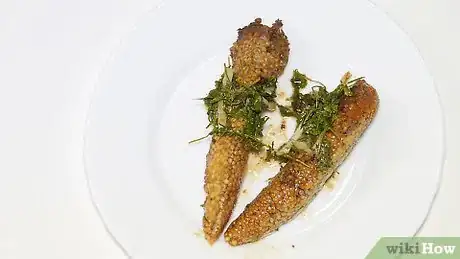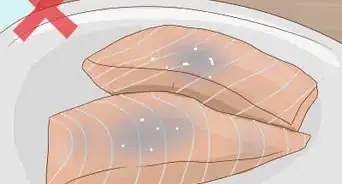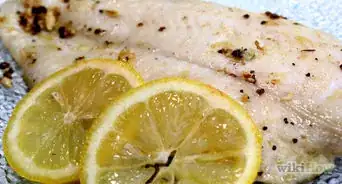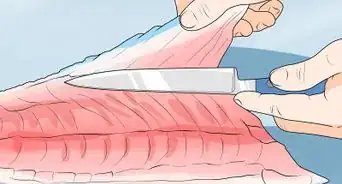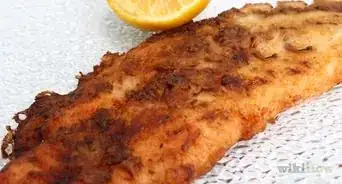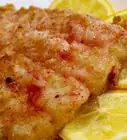This article was co-authored by wikiHow Staff. Our trained team of editors and researchers validate articles for accuracy and comprehensiveness. wikiHow's Content Management Team carefully monitors the work from our editorial staff to ensure that each article is backed by trusted research and meets our high quality standards.
The wikiHow Culinary Team also followed the article's instructions and verified that they work.
This article has been viewed 96,801 times.
Learn more...
Fish roe, or fish eggs, can be cooked in a variety of ways to make a delicious, unique meal. Whether you're frying the roe with breadcrumbs, poaching it in butter, or sautéing it in a pan, it's a yummy delicacy that goes great with many different foods. You can season and flavor your fish roe with all kinds of ingredients, like onion, garlic, capers, shallots, and lemon.
Ingredients
Fried Fish Roe
- 1/2 pound (220 grams) of fish roe
- 1⁄4 cup (59 ml) of milk
- Salt and pepper to taste
- 1/4 cup (20 grams) of cornmeal
- 2 tablespoons (16 grams) of all-purpose flour
- 3 US tbsp (44 ml) of oil
- 1 large onion, thinly sliced
- 1 tablespoon (9 grams) of garlic, finely chopped
- 1 US tbsp (15 ml) of lemon juice
Poached Fish Roe
- 1 1/2 pounds (680 grams) of shad roe sacs
- Melted butter
- Sauce to top the roe
Sautéed Fish Roe
- 1 pound (450 grams) of fish roe
- 1/4 cup (55 grams) of butter
- Salt and pepper to taste
- 2 tsp (9.9 ml) of lemon juice
- 1 tablespoon (4 grams) of chopped parsley
- 2 teaspoons (2 grams) of chopped chives
- 2 teaspoons (2 grams) of chopped thyme
Steps
Frying Fish Roe
-
1Rinse the fish roe in a bowl of fresh water. Fill a clean bowl with cool water and place the fish roe in it. Use your fingers to move the water around the roe, cleaning it super thoroughly.[1]
- Use white perch roe for a great taste in this recipe.
- Wash your hands before and after handling the roe.
- Set the roe aside on a plate once it's clean.
-
2Combine the milk, salt, and pepper together in a dish. Use a shallow bowl or baking dish to hold the ingredients. Pour 1⁄2 cup (120 ml) of milk into the dish as well as a few sprinkles of salt and pepper, depending on your tastes. Stir the ingredients together with a spoon so they’re well combined.[2]
- If you're not sure how much salt and pepper you'd like on your roe, start with a small amount. You can always add more after the fish eggs are cooked.
Advertisement -
3Mix cornmeal and flour together in a separate dish. Use a dish that’s a little bit smaller than the first dish you used. Pour 1/2 cup (20 grams) of cornmeal and 2 tablespoons (16 grams) of flour into the dish and stir them together with a spoon so the dry ingredients are thoroughly mixed.[3]
- It's also okay to use a whisk or fork to combine the ingredients.
-
4Coat the roe in the milk mixture and then the cornmeal mixture. Place the roe in the milk mixture and thoroughly coat it before you dip it into the cornmeal and flour mixture. Make sure the cornmeal mixture is coating the roe on all sides for the best taste.[4]
- Coating the roe in the milk mixture thoroughly is important so the cornmeal mixture will stick to it.
-
5Place the roe in an oiled skillet set on medium-high heat. Sprinkle olive oil into a large skillet so the pan is evenly coated in a light layer. Set your burner to medium-high heat and wait for the skillet to heat up before placing the roe on it.[5]
- Spread the roe out evenly on the skillet so they cook thoroughly.
-
6Cook the roe for 2-3 minutes on each side so they’re golden brown. Let the roe fry in the skillet for 2-3 minutes before using a slotted spoon or spatula to flip each one over. Wait another 2-3 minutes for this side to cook before checking the roe. When the sides are golden brown and slightly crispy, it’s done.[6]
- It’s a good idea to cover the pan when the roe is frying because the fish eggs tend to sizzle and pop.
- Set a timer for each side so they're cooked evenly.
-
7Set the fish roe on a paper towel to let them drain. Once the roe is done frying, move each one to a paper towel-lined plate. Let them sit on the plate while you finish the rest of the cooking so the excess oil is absorbed.[7]
- Cover the roe with an additional paper towel on top to help trap the heat.
-
8Add the onions to the skillet and cook them for roughly 8 minutes. Pour a little more oil into the pan if necessary and add the chopped up onions as well. Stir them as they cook for about 8 minutes, or until they become tender and slightly brown.[8]
- Stir the onions around frequently so they don't stick to the pan.
-
9Sprinkle garlic into the skillet and cook for a minute before adding lemon juice. Keep the onions in the skillet and add in 1 tablespoon (9 grams) of garlic, mixing it with a wooden spoon for a minute so the garlic can cook. Pour in 1 US tbsp (15 ml) of lemon juice and combine all the ingredients thoroughly.[9]
- Once the lemon juice is properly mixed in, the mixture is ready.
-
10Pour the onion and garlic mixture over the roe and serve it hot. Place the roe on a clean plate so it’s ready to be eaten. Scoop the garlic, onion, and lemon mixture out and drizzle it over the fried roe. If you’re not sure whether you’ll like the sauce or not, pour a small amount over the roe to begin with.[10]
Poaching Fish Roe
-
1Separate the roe sacs from each other carefully. Pull the fish sacs away from one another so it'll be easier to poach them. Do this very gently using your fingers or lightly with a spoon, being careful not to pierce them.[11]
- Shad roe is used in this specific recipe but other fish roe can be substituted.
-
2Rinse the roe under clean water and dry them off. Put the roe in a strainer and hold them under clean running water for a few seconds to clean them. Lay them on a clean paper towel and use another paper towel to gently pat them dry.[12]
-
3Put the roe in a pan and fill the pan with enough water to reach the roe's sides. Spread the roe out in a frying pan that's just big enough to hold them all in one even layer. Pour water into the pan until it comes up to the middle of the roe's sides.[13]
-
4Pour the water into a cup to measure out the butter and remove the roe. Drain the water out so it's separated from the roe and pour it into a measuring cup. Whatever the water measurement is, that's how much butter you'll need in the pan. Measure out that amount of melted butter to be poured into the pan.[14]
- Transfer the roe back out of the pan and wipe the pan down so it's dry.
-
5Heat the butter in the pan until it starts to bubble. Pour the measured amount of melted butter into the pan and set it to medium heat. Once the butter starts bubbling slightly, it's ready for the roe.[15]
-
6Cook the roe in the pan for 8-11 minutes, flipping it over so it cooks evenly. Place the roe in the butter and let it cook on medium heat for 1 minute. Turn the heat down a little bit and cook the roe for 2 minutes before flipping them all with a spatula or other kitchen tool. Continue letting the roe cook for 5-8 more minutes until they're cooked through and opaque.[16]
- You'll know the roe is done when it changes color and is no longer transparent.
- Keep flipping the roe over in the pan to ensure it cooks evenly and doesn't stick.
-
7Serve the cooked roe with a sauce of your choice. This could be a brown butter sauce, a sauce made of peppers, or any other sauce you like to put on fish. Remove the roe from the pan and pour your sauce on top before serving it.[17]
Sautéing the Roe in a Pan
-
1Heat the butter in a large pan over medium heat. Cut a slice or two of butter and place it in the pan so it starts to melt. Use as much or little butter as you'd like for the roe's taste, but at least use enough to coat the bottom of the pan completely.[18]
-
2Place the roe in the pan and sprinkle it with salt and pepper. Once the butter has melted, put the roe in the pan and spread it out. Sprinkle it with salt and pepper depending on how much you'd like to use according to your taste preferences.[19]
- Rockfish roe is great for this recipe, but any fish roe will work.
-
3Cook the roe in the pan for 10 minutes, flipping it over once. Let the roe cook for 5 minutes before you flip it over with a spatula or other kitchen tool. Once the roe is flipped over, cook it in the pan for another 5 minutes.[20]
- Be careful when you flip the roe so it doesn't break.
-
4Remove the roe when it's brown and cooked through. After the roe has been cooked for 10 minutes, it should be done. If you're not sure whether the roe is cooked through or not, use a fork and pierce the roe to check. Use a spatula to transfer the roe to a plate.[21]
- Set the plate of roe aside while you cook the rest of the ingredients.
-
5Add the other ingredients to the pan and heat them up. This includes the lemon juice, parsley, chives, and thyme. Put all of these ingredients in the same pan you used to cook the roe and let it heat up over medium to medium-low heat.[22]
- Mix the ingredients in the pan with a large pan to ensure they heat up evenly.
-
6Pour the mixed ingredients over the roe and serve it. Once the other ingredients are warm, add them to the roe by pouring them directly on top. Now your roe is ready to be served![23]
Warnings
- While you can eat fish roe raw, cooking it will kill any bacteria or parasites it might have.⧼thumbs_response⧽
References
- ↑ https://www.youtube.com/watch?v=pG4TvYZ36-s#t=45s
- ↑ https://www.npr.org/templates/story/story.php?storyId=125898335
- ↑ https://www.npr.org/templates/story/story.php?storyId=125898335
- ↑ https://www.npr.org/templates/story/story.php?storyId=125898335
- ↑ https://www.youtube.com/watch?v=pG4TvYZ36-s#t=2m35s
- ↑ https://www.npr.org/templates/story/story.php?storyId=125898335
- ↑ https://www.youtube.com/watch?v=EXZxv7AH1ro#t=6m7s
- ↑ https://www.npr.org/templates/story/story.php?storyId=125898335
- ↑ https://www.npr.org/templates/story/story.php?storyId=125898335
- ↑ https://www.npr.org/templates/story/story.php?storyId=125898335
- ↑ https://www.nytimes.com/1998/05/27/dining/shad-and-the-other-roes-of-spring.html
- ↑ https://www.nytimes.com/1998/05/27/dining/shad-and-the-other-roes-of-spring.html
- ↑ https://www.nytimes.com/1998/05/27/dining/shad-and-the-other-roes-of-spring.html
- ↑ https://www.nytimes.com/1998/05/27/dining/shad-and-the-other-roes-of-spring.html
- ↑ https://www.nytimes.com/1998/05/27/dining/shad-and-the-other-roes-of-spring.html
- ↑ https://www.nytimes.com/1998/05/27/dining/shad-and-the-other-roes-of-spring.html
- ↑ https://www.nytimes.com/1998/05/27/dining/shad-and-the-other-roes-of-spring.html
- ↑ https://www.npr.org/templates/story/story.php?storyId=125898335
- ↑ https://www.npr.org/templates/story/story.php?storyId=125898335
- ↑ https://www.npr.org/templates/story/story.php?storyId=125898335
- ↑ https://www.npr.org/templates/story/story.php?storyId=125898335
- ↑ https://www.npr.org/templates/story/story.php?storyId=125898335
- ↑ https://www.npr.org/templates/story/story.php?storyId=125898335
